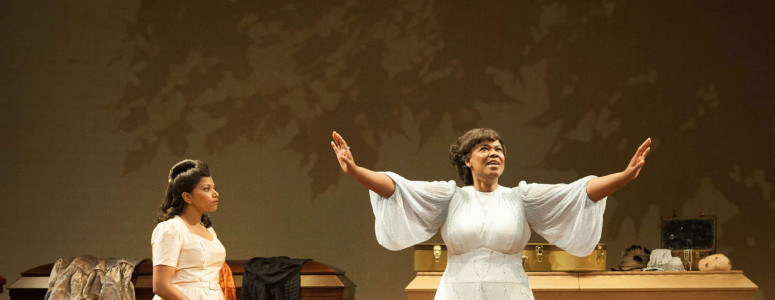I’m expecting a show that could almost be called “site-specific.”
After all, I’d heard of Sister Rosetta Tharpe (1915-1973), the acclaimed Gospel singer who in the ‘30s dared to bring a new sound to church music – one that would be later categorized as rock ‘n’ roll.
Now her story, MARIE AND ROSETTA, would be at a church – well, a converted one, for the Atlantic Theater Company’s 20th Street home does operate out of what had been part of St. Peter’s complex.
One look at Riccardo Hernandez’s coffin-filled set, however, informs me that George Brant’s new play will take place in the basement of a funeral parlor. There’s Marie Knight daintily putting on make-up on Sister Rosetta, who, we can tell from her ornate sequined dress, is a woman of some importance. If you doubt it, note that Rosetta demands being addressed as “Sister” more than an old-world Catholic nun would.
Considering the locale, we’re within our rights to assume that we’ll soon experience a full-of-music African-American funeral. Not at all. The basement is one place in this 1933 Mississippi town where Sister Rosetta can relax unbothered by the many Caucasian citizens who wish she weren’t there. That’s why she’s hired a white bus driver, feeling he’ll be allowed, even if begrudgingly, to maneuver her and her entourage through the unfriendly town. She must get to those barns and warehouses, the only venues where she’s allowed to sing.
Don’t we expect that the initial conflict will be that Sister Rosetta will roar with displeasure with Marie’s make-up job? On the contrary: Sister is full of compliments. That includes her insistence that Marie is a substantially better piano player: “Own up to your gift,” she tells the lass.
Sister Rosetta turns out to be is a natural mentor who encourages Marie to find herself and to be herself. Brant does a fine job of nicely calibrating the burgeoning friendship. Actress Kecia Lewis offers a wonderful turn-around, too, when she has Rosetta go from insisting on “Sister” as an honorific to making it a term of endearment. She genuinely seems to want to be A Big Sister to Marie.
Trouble is, Marie doesn’t believe in Sister Rosetta’s literally rocky way of delivering Gospel music. She prefers straightforward and proper liturgical songs (even if they have such grisly lyrics as “Were You There When They Crucified My Lord?”). “A little more barrelhouse and boogie,” Sister Rosetta insists, while the Marie wants “less rockin’.”
We get ample chances to hear each woman’s view, for this “play with music” may indeed offer more songs than HELLO, DOLLY! Listening to these blues-infused songs, one sees that a song in STARLIGHT EXPRESS does tell the truth. It whimsically goes “The first line of the blues always gets sung a second time” followed by – yes — “The first line of the blues always gets sung a second time.” That’s not quite always the case of the songs that pepper MARIE AND ROSETTA, but repeated first lines certainly occur a substantial number of times.
The songs run the risk of seeming like filler. Does Brant simply not have all that much to say about these two people and thus opts for musical divertissements?
The biggest issue has Marie’s weighing Sister Rosetta’s job offer to come on the road with her. That would mean leaving her husband and, more to the point, two children behind. On the other hand, there’s more money to be made with Sister, and that sent-home cash could do the three stay-at-home Knights a world of good. (Sister Rosetta also shows a good deal of fury that she’s been eclipsed in the public’s eye by Mahalia Jackson.)
Credit director Neil Pepe for masking these potential potholes by keeping matters moving, and, of course, for casting Lewis and Rebecca Naomi Jones, who have done him proud in this two-hander.
The audience certainly didn’t mind the inclusion of songs. Many theatergoers’ heads could be seen swaying back and forth to the music. After each song, both actresses must wait a few seconds longer to speak than reality would dictate because the applause takes a good deal of time to abate. When Lewis and Jones reach “Up Above My Head” – about 70 minutes into the 90-minute show – the applause starts in the middle of the song, for the audience can’t wait for the end to show its appreciation.
Are Lewis and Jones actually accompanying themselves on piano and guitar? At the end of the show, the scrim behind them is lit to reveal guitarist Felicia Collins and pianist Deah Harriott. Yet Lewis and Jones do such a good job of miming that while you’re watching, you might believe they’re strumming the strings and tickling the ivories.
Jones does an excellent job of starting out utterly intimidated with heroine worship for this burgeoning star. At first, her Marie is too nervous to even show a sense of humor. But assistants quickly become acclimated and stand up for themselves, don’t they?
Lewis has all the required grandeur, aura and complacency of a star. “When I look at heaven, people need to see heaven looking down,” she insists, following up that confidence with “Between me and Jesus, we make a masterpiece.” (Note to whom Sister Rosetta gives top billing.)
Brant constantly wants to surprise us, and that includes what he’s whipped up for his ending. But that twist does seem to be there simply for the sake of surprising us. In the end, though, his main question remains. Can rock function as The Lord’s Music? Well, if God loves all His children, as many allege, may we at least infer that He loves all His children’s music? MARIE AND ROSETTA makes an excellent case for it.




